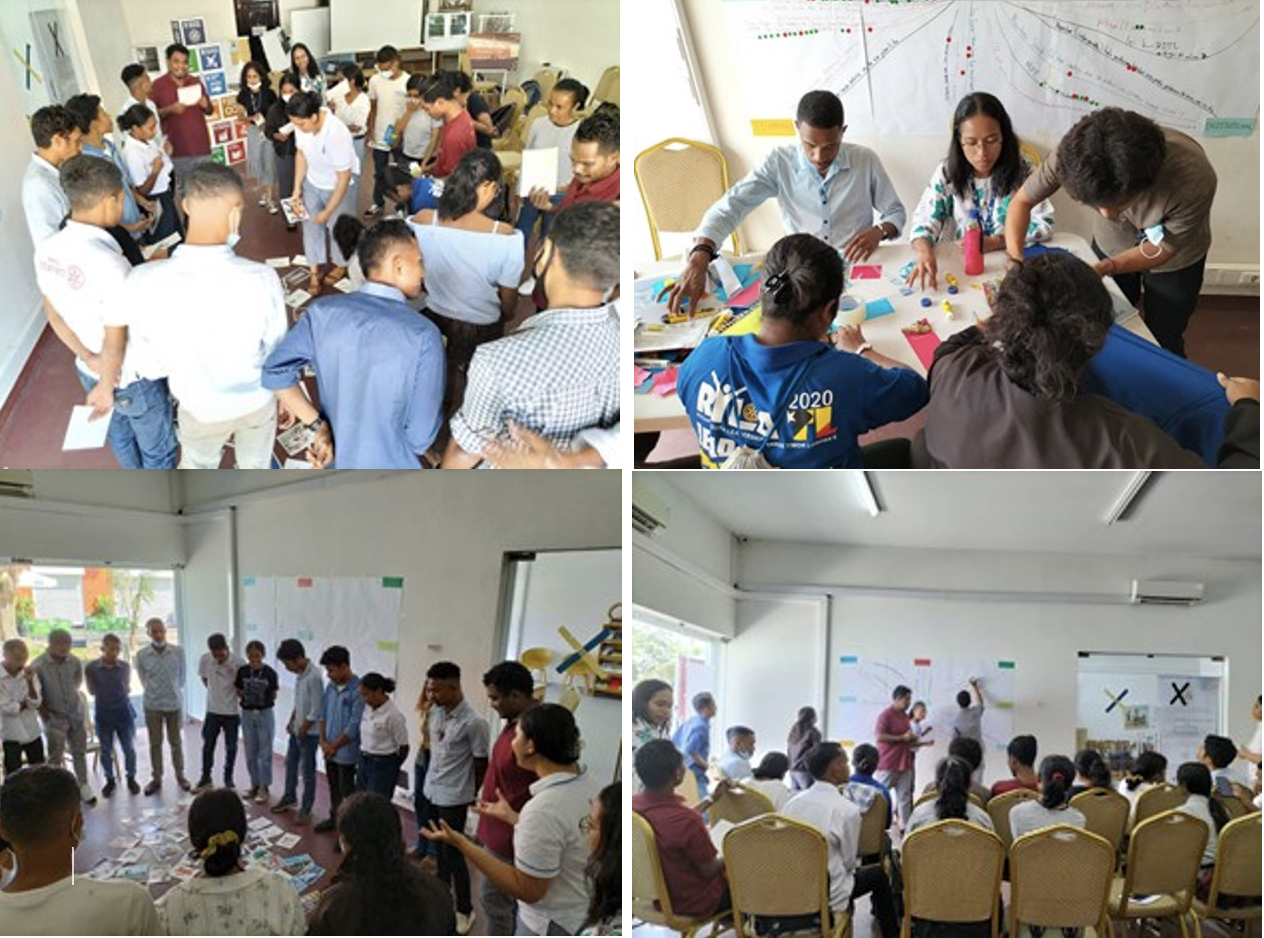Co-learning with youth about the impact of climate change in Timor-Leste
August 9, 2022

Presenting Solution Mapping to the team
Our half island nation Timor-Leste continues to experience the impact of climate change. On April 4th, 2021, we were hit by torrential rain which led to soil erosion, land slides and flooding in most municipalities in Timor-Leste. This disaster affected more than 30,564 households in the entire country, 81% of which were in Dili Municipality. The impact of climate change no longer exists only in textbooks, but it is a reality manifested in the form of disasters and extreme weather patterns that pose a threat to all living beings on the planet, people’s livelihoods, and the sustainability of the environment. In order to gain insights into the impacts of climate change in Timor-Leste, we embarked on two separate learning activities with youth.
We started by designing a three-day trip with six battery-powered three-wheeler vehicle “Tum-Tum” to travel around inner city of Dili in late March 2022. This initiative was done in collaboration with the Youth Conversation Platform team from UNDP Timor-Leste’s parliament project. The idea was to introduce clean energy solutions (i.e. the Tum Tum which is used as a form of public transportation in neighboring municipality) that already exist in Timor-Leste, experience it while at the same time engage youth in the informal conversations about climate change with UNDP team.

Our Issue Mapping, Stakeholders Mapping and Prototyping team
While many were seemingly happy to join the trip, there were many who were reluctant to join, and we learned that it was because they were not aware of the term climate change (in Tetum: Mudansa Klimatika) but were familiar with the term “natural disaster” (in Tetum: disaster naturais). As we managed to convince them to join us, the trip became an opportunity for us to connect with them and share what climate change means and how it has impacted many people in Timor-Leste. Some important notes we captured were about solutions generated when people encountered natural disasters. Domingos*, a university student in Dili, said that our lifestyles contribute to climate change and yet people are still not learning to make behavioral changes. We need to start reforestation in the hills in Dili so that we can lessen the soil erosion during the rainy season, he said. We also need to conserve water for new trees seedlings to grow in some places where it is prone to landslide so that these tree seedlings can continue to grow despite heavy rain and flooding. Check our vlog to learn more about our field learning experience on climate change with youth in Dili.
Another fruitful experience that we had was with youth leaders working on climate change in Timor-Leste who joined our two-day learning workshop using collective intelligence (CI) to contribute to SDG 13 – Climate Action in mid-May 2022. Collective Intelligence is one of the tools that Accelerator Lab uses to assist in collective learning for social innovation. The youth leaders were very enthusiastic to participate in the discussion and learn from others in the same room. According to Anita*, the workshop made her want to explore more ideas and work collectively with her team because this workshop was very different from traditional workshops where most of the time only speakers or resource persons lead the conversations while the audience mostly sit quietly. The participants also found the CI learning workshop fruitful as it involved acknowledging local solutions made by local people to solve problems created by climate change. Another participant, Anna* added that she enjoyed exploring local solutions particularly solutions that help people understand the impact of climate change and how to better protect our environment. “Plastics are everywhere in Dili, plastic bottles, lids, plastic plates and plastic bags. plastic should be recycled and reused. We can reuse them for making arts products to raise awareness to people about the importance of minimizing the use of plastic”
From these two activities we learned that informal conversations can enable youth to engage in important topics such as climate change and learn from each other. We also found that the Collective Learning workshop boosted participation and teamwork. Most participants appreciated UNDP Accelerator Lab team for sharing the knowledge on collective intelligence tools and encouraged UNDP to do more learning workshops to increase awareness, build resilience in the community and empower all citizens to be part of solving social challenges related to climate change.

Solutions Mapping teams’ visit to the exhibition of local products and services at Dili Convention Centre
"Let the future say of our generation that we sent forth mighty currents of hope and that we worked together to heal the world".Jeffrey Sachs

 Locations
Locations



